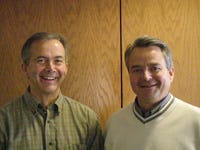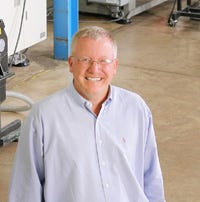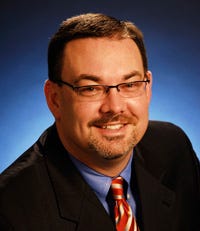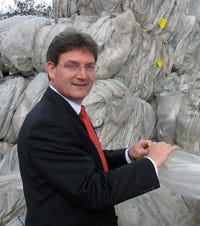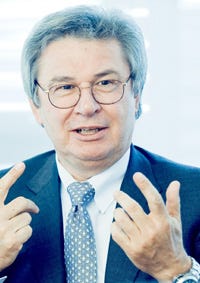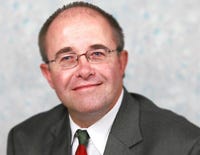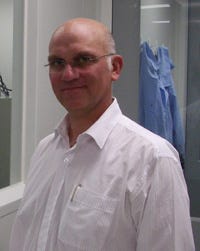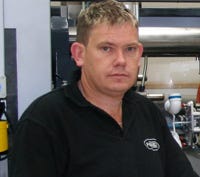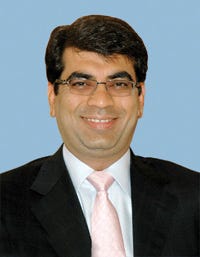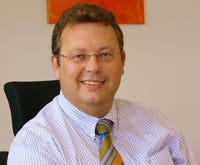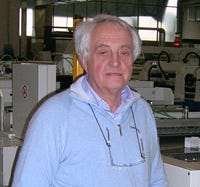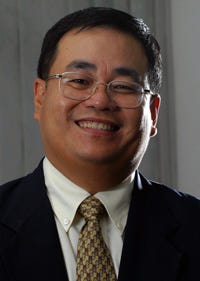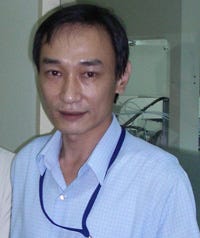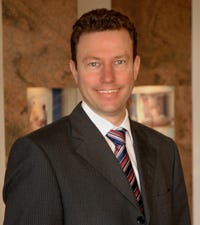Notable Processors 2009
Many of our pages each year are necessarily devoted to the tools and materials—and their makers—that we think our readers need to hear about. But we also like to turn the spotlight full on those readers once each year, the processors who ultimately bring all the elements together. They’re not an attention-seeking bunch, but nonetheless we want to recognize some of the outstanding people who make plastics happen. Here’s our 2009 class of Notable Processors.Carl and Daven Claerbout
April 16, 2009
Many of our pages each year are necessarily devoted to the tools and materials—and their makers—that we think our readers need to hear about. But we also like to turn the spotlight full on those readers once each year, the processors who ultimately bring all the elements together. They’re not an attention-seeking bunch, but nonetheless we want to recognize some of the outstanding people who make plastics happen. Here’s our 2009 class of Notable Processors.
Carl and Daven Claerbout
Not to understate the value of planning, but many highly successful business people stumble into jobs that grow into careers, and in some cases, legacies. In 1967, Bill Claerbout was a successful real estate investor and auctioneer when one of his properties, a rotational molding plant, was essentially abandoned. Rather than let the business die, Claerbout called the only customer at the time and said, “Why don’t we keep this going?” recounts his son, Daven Claerbout, who now runs the business with his brother Carl.
|
From six employees and one site, Dutchland Plastics (Oostburg, WI), which added blowmolding capabilities, has grown to more than 300 workers and three facilities. Sales have grown every year save one since 2000, expanding from around $15 million at that time, to more than $30 million in 2008. Bill Claerbout passed away last September at age 82, but the accidental rotomolder’s legacy lives on with his sons, as well as grandchildren, with Daven’s son and daughter, Billy and Lindee, working for the company where their dad and uncle started at ages 9 and 11, respectively.
Carl always knew he’d work at Dutchland, putting away money earned from trimming parts his father brought home, but Daven’s epiphany came after college, when he realized what his father had meant to the community. “Just seeing the respect and how excited people were to see him,” Claerbout says, “and every once in a while, people say, ‘You sound just like your dad,’ and, ‘You act just like your dad.’ That to me, and I’m sure Carl would echo this, was the ultimate compliment. It was like my dad’s going to leave a legacy of really being a father to a lot of people. Employing so many people is not a bad legacy to leave, as long as you treat them all fairly.”
Tom Duffey
How many processors can say their best month ever was January 2009? Probably only a handful, and the others likely started business that month. But Tom Duffey’s been at the helm of Plastic Components Inc. (PCI; Germantown, WI) since he opened it in September 1989.
Duffey attributes his firm’s success to two decisions, one made before it opened and one made about five years ago. As an MBA student at Northwestern’s Kellogg school, he developed his idea of a fully automated injection molding facility. His professor scoffed but he pursued the plan, opening the shop “with three presses and some makeshift conveyors.” Now PCI runs 42 full-automated cells. “We are as automated as humanly possible,” he says.
That automation separated him from the pack for many years but, in about 2004, he saw the need for more, so he made marketing and new business development a strategic business initiative. Patience plays a part too. “We’ve two guys at (a foreign-owned OEM) today,” he said on the day he spoke with MPW, “but it took us two years to get the appointment.” Once in the door, though, PCI rarely leaves without new business; the molder tools up about 60 new parts/year, he says, with most of that new business from customers “who’d never even heard of us before.”
How can a molder afford to devote so much time, effort and payroll to marketing and business development? Duffey turns the question around: how can a molder not afford it? For PCI, staying fully automated has freed the capital necessary to invest in marketing, business development, plus a major investment in Moldflow software and in an ERP system from IQMS.
Steve Dyer
Tough times have hardly dampened the enthusiasm of Steve Dyer, who took over as president and CEO of Dickten Masch (Nashotah, WI) last November, returning to the plastics processing industry after a few years spent in senior positions at OEMs ClearEdge Power Inc. and Heatcraft Worldwide Refrigeration.
“There will be, unfortunately, closures and consolidation; we want to be in a position to take advantage (of that),” he says. The molder has had its own tribulations of late, releasing about 20 employees in early February. It now employs about 227 at two sites: the Wisconsin HQ and a employee facility in Iowa. “We’re full of lean practitioners, so we’ll stay competitive,” he adds. Even as it let go of some employees, it hired engineers and a new business development manager.
After years spent with OEMs, he says the need for "partner processors" able to handle an entire project, and bring their own ideas to the table, has never been greater. Experienced employees for mold flow analysis and FEA (Finite Element Analysis) are two arrows in Dickten Masch’s quiver he says make it particularly attractive to OEMs. His company processes thermosets and thermoplastics, and also makes about 75% of its own tooling because, he says, “We want to control our own destiny.”
He is a strong believer in the "Open Innovation Model" which assumes that the answers to most problems are already out there, but processors need to spend more effort finding them.
Tom Emans
Many processors have developed inhouse recycling programs to ensure production scrap is re-used, but rare is the processor who devotes as much energy to "closing the loop" as does film extruder CeDo (Mönchengladbach, Germany). The processor’s agricultural film collection and recycling system in Geleen, Netherlands is the only such facility in the world to have attained full lot traceability to EN15343 standard. Tom Emans, managing director of the Geleen facility, says such recognition only comes when a processor remains focused. “We have a dream here—it’s a simple as that: focus on and aim at the highest possible value item that you can—and directly replace it through recycling.” Most of the material re-processed at Geleen is extruded later at CeDo facilities in England and Poland.
“CeDo Geleen is about making the 100% closed loop recycling ideal come true. We’re already doing it for some supply streams here in the Netherlands and we’re also in the process of extending it as far into all European markets as it can go,” says Emans, who notes the site went so far as to invest recently in equipment to recycle “the thinnest of agricultural films—only some 10-20 microns thick.” His facility is recycling about 46,000 tonnes/year of plastic, and he’s lined up at least that from alternate sources should existing supplies soften or prices become an issue. His goal: to run the company’s plastics recycling facility 24/7, just as he would one of CeDo’s plastics processing facilities.
Klaus Fischer
Started by his father in 1948 as an injection molder of pegs used to anchor screws in walls, the Fischer group of companies has become an internationally active organization with a number of different business units ... but with injection molding still the foundation of many of them, including the automotive systems business started by Klaus Fischer in 2001. His father, Artur, focused on product innovation, and while that remains one of the company’s hallmarks, CEO Klaus Fischer, in charge since 1980, has pushed the company (Waldachtal, Germany) to be progressive in its management and its employee training, with lean manufacturing being a fact at the company long before most processors had even heard of it. He pushed the company to develop its own lean manufacturing/continuous improvement philosophy, called Fischer Process Systems, and in 2004 even added a new business unit, process consulting, to spread the company’s philosophy to other manufacturers. The company’s Horb, Germany facility, part of its automotive systems business, won a national lean manufacturing award last fall.
Training is more than just talk at the company; last November it opened its new €8 million employee customer training center, where Klaus Fischer says it hopes to double the number of employees and customers—already in the thousands—that the company schools annually.
Joachim Franke
When in 2005 Mikron’s plastics division was bought out and renamed forteq (Nidau, Switzerland), Joachim Franke was serving as GM of the healthcare division for injection molder Weidmann Plastics Technology. Two years later Franke, a chemist who also had worked for Bayer, joined forteq as managing director for its healthcare business, and also as a member of the group management. “Mikron Plastics Technology was Mikron’s plastic division for half a century,” Franke says. “But in order for Mikron to concentrate on its core business automation and precision machinery, the plastics division was bought out and renamed.”
Offering engineering, manufacturing and assembly for high-volume production of plastic parts for the automotive, healthcare and consumer electronics industries, forteq is still all about plastics today. Franke calls it an advantage in the current economic crisis to have multiple areas of expertise. “While the entire industry, and therefore our automotive sector, is affected by the decrease in demand, medical technology is going to increase in the medium term, especially in Switzerland,” Franke explains. “So our medical sector is a definite plus for us right now.” Looking ahead, Franke’s objective at forteq is to develop more efficient products that improve people’s health and save lives.
Erol Harvey
Erol Harvey is thinking small when it comes to the future of the company he heads: Autralia’s MiniFAB (Scoresby, Victoria). Make that nano-small. The start-up was born in 2002 to commercialize disposable diagnostic biochips typically fabricated from polycarbonate. These biochips incorporate microfluidic molded channels that are around 100 µm deep with 500-nm tolerance.
MiniFAB currently operates a single Toshiba all-electric injection press in a cleanroom, and for lower volumes it turns to processes such as rapid prototyping and nanoimprint lithography. “One of our fortes is ramping up production by switching processes without having to redesign the device or change the material,” Harvey says.
Disposable diagnostic cartridges are set to become a major growth market with the advent of “point-of-care” equipment that enables testing at a general practitioner rather than a hospital. MiniFAB’s first commercial product is used in a device that can detect eye diseases by analyzing nanoliter tear samples.
“The U.S. is very much focused on silicon in the diagnostic field, but we are incorporating silicon chips into plastic substrates,” says Harvey.
Chris Henderson
Efficiency is the essence for any processing operation in this competitive day and age, as are products that are differentiated and boast added value. Go no further than Haigh Tooling Ltd. in Christchurch, New Zealand to find a classic example of this.
Haigh Tooling has been around since 1971, but it only started molding in 2004 with three machines, run by three operators. The toolmaker’s traditional focus was plumbing components and when it came up with an innovative design for a wastewater trap around 2002, it soon decided to bring production in house to ensure stable delivery and maintain overall control.
Enter Production Manager Chris Henderson in 2006, who is now the sole staff member of the Plastics Division, having brought in robots and configured the machines so that they now run 16 hours a day unmanned with the aid of a production monitoring system. Henderson’s role is to schedule production, change tooling, and ensure his machines are running smoothly during the day in readiness for the overnight production run.
Haigh’s latest investments include an energy-efficient all-electric chosen for its repeatability and a Babyplast side injection unit as a cost-effective approach to entering into two-shot molding. “In the future, we want to invest in more automation to do as much to the part as possible before it reaches our assembly team,” says Henderson.
Atul B. Jain
Many global processors started with a shoestring budget but Jain Irrigation Systems (Mumbai), said to be India’s largest plastics pipes and fittings processor, certainly rates among the most spectacular for its growth. In 1963 Bhavarlal Jain, as a young law graduate, started selling kerosene from a pushcart and founded the family business that includes trading, food and nutritional supplements production, extruded sheets, drip and sprinkler irrigation systems, as well as PVC and polyolefin pipes and fittings.
Today the company has 21 plants, a turnover of $456 million/yr, exports $115 million from its India operations, and was named in 2007 by Standard & Poor’s as one of eight Indian companies expected to emerge as challengers to the world’s leading companies. The family-owned enterprise employs more than 5000 people.
Pipe extrusion is the backbone of the entire operation. Last year it extruded and injection molded more than 100,000 tonnes of resin. PVC pipe demand showed 84% growth in 2008 and demand for micro-irrigation systems was up 88%. Why such demand in this sector? Atul Jain, director of marketing and youngest son of the chairman, says it is because “water, nature’s gift to mankind, is not unlimited and free forever. World water resources are fast diminishing.” Drip irrigation, which relies on extruded tapes and pipes, could help, as it increases crop yield by as much as 230% compared to flood irrigation, and it saves as much as 70% of potable water use. Fertilizer efficiency is increased by 30% and crop maturity results in higher and faster returns on investment, he says.
Dieter Pfister
Maincor (Schweinfurt, Germany), a processor of corrugated and composite pipe, sees its diverse offering helping to tide it over in rough financial times. Turnover in 2008 was €75.4 million. Not only does the company process pipes, but it also designs and assembles complete extrusion lines for processing multi-layer composite pipe, corrugated, smooth, and drip irrigation pipes. Working together with Cincinnati Extrusion (Vienna, Austria) and other big equipment players, it provides turnkey plants that, says Dieter Pfister, company chairman and CEO, are in increasing demand in Russia, the CIS countries, and the Middle East.
Prime among its offering as a processor are multi-layer composite pipes (for example, polyethylene raised temperature [PE-RT]/tie/aluminum/tie/PE-RT) for under-floor heating as well as warm water distribution. Aluminum tape is inserted through the die head extruding the inner plastics pipe. The tape is overlapped and welded. An adhesive and outer PE-RT layer are then extruded via an angled extrusion head over the aluminum to produce a highly flexible barrier pipe system said to be less susceptible to damage than EVOH barrier pipes.
A recent development at its Mainpex subsidiary is an online service, shop.mainpex.de, for plumbers and installers. This is designed to speed delivery, cut out the middleman, and provide an instant calculation of the amount of pipe needed, necessary fittings, and cost.
Claudio Rovelli
Packaging laminator Plastar Pak (Concorezzo, Italy) proves again that innovation often springs from small operations. Claudio Rovelli saw a need back in 1978 for heavy-duty barrier packaging offering good optics for the food industry, so he developed his own laminating, cutting, and welding machinery for the job and ran his one-man operation on a shoestring plus a lot of hope.
Today the 32-staff operation, working two shifts five days a week, laminates, cuts, and welds up to 500,000 bag units/24hr for its fresh meat, cheese, seafood, and produce customers. It uses seven bag making and welding lines delivered from Italian equipment producer ELBA (Magnago), its supplier for the past decade. The company also runs an eight-color flexographic printing press.
“I just saw a need and thought, ‘Well, if others aren’t providing this kind of packaging, why shouldn’t I take the plunge and start up my own operation?’” he recalls. That entrepreneurial spirit and determination has since garnered more than 1000 clients, mainly domestic packagers but with about 15% of sales via exports in Europe.
Rovelli believes flexibility is essential to assure continued growth. One sector Plastar has targeted successfully is barrier laminated vacuum packaging bags to preserve leftovers or for individual servings that can be stored in a home freezer. Specialty film, with crisscross diamond-shaped embossing on the bag interior, aids in evacuating air.
Lim Chun Yow
Lim Chun Yow, chairman and managing director of Malaysian packaging giant BP Plastics (Batu Pahat), is confident his company has what it takes to ride out the current global financial turmoil and emerge ready to make the most of the long-term growth potential of its core products: which include stretch film, shrink film, and lamination film.
One of a triumvirate of Malaysian global packaging players, the $65 million concern currently turns out 36,000 tonnes of cast stretch film annually, backed up by an array of blown-film equipment for lamination and industrial packaging products with combined capacity approaching 17,000 tonnes/year. Sixty percent of production is destined for export to 25 countries.
“We’ve invested in seven- and nine-layer lines because employing the latest technology gives us the option to select the right combination of resins to produce good quality and cost competitive stretch film,” says Lim. Value addition is also an important component of BP Plastics’ business strategy. “This is critically important since more customers are looking for innovative and sustainable packaging to reduce packaging costs while maintaining their packaging product integrity,” says Lim.
To ensure its customers remain happy, “We are always keeping ourselves lean, recruiting talent and providing them with good training, employing the latest technology, and using the latest advanced resin to innovate and produce cost competitive, quality packaging products,” says Lim.
David Wang
Thirty-nine-year-old David Wang is one of a generation of young Taiwanese entrepreneurs with a mission—supplying the market with niche products that are out of the reach of Mainland China processors.
His company, View Optical (Hsinchu), was established in 2005 and focuses on molding specialty lenses for office equipment such as scanners and copy machines, as well as containers for contact lenses. The contact lens containers are in fact highly precise optical components in their own right. Made from a special PP grade under cleanroom conditions, the inner surface is molded to an exacting tolerance, and then a polymeric material called poly-hema is spin-casted onto this surface to form the actual contact lens. The containers are then filled with a storing solution and sealed with aluminum foil.
“Both our lens businesses are highly automated so we don’t need to worry about competing with China,” says Wang. The future focus will be on contact lenses, however. Production started in April 2008 at the level of 500,000/month and is set to reach 4 million/month in the near future.
Kurt Woelfl
Whereas many small companies are downsizing and transferring operations abroad, ODU Steckverbindungssysteme GmbH & Co. KG (Mühldorf, Germany)—a contacts and connector specialist for the medical technology industry—continues to expand its domestic production capabilities. The firm has invested more than €30 million in new machinery and plant and created over 100 new jobs in the last five years. The moves have drawn positive recognition: ODU was one of three companies applauded for its accomplishments in 2008 by the Bavarian Medium-Sized-Business Awards.
ODU received special recognition for its staff development program and, in particular, its vocational training. “We are engaging in a partnership with dedicated young people,” says ODU president and CEO Kurt Woelfl. “We then continue this partnership with staff development programs. Everybody benefits from that—our staff, ODU, and our customers.”
Before Woelfl took charge 2005, he served as ODU’s technical manager from 2001-2005. His academic credentials prepared the way, with undergraduate and graduate engineering degrees from Stanford University and a PhD in mechanical engineering from the Technical University in Munich. He also worked previously for BMW in the Bavarian capital. —[email protected]
About the Author(s)
You May Also Like
